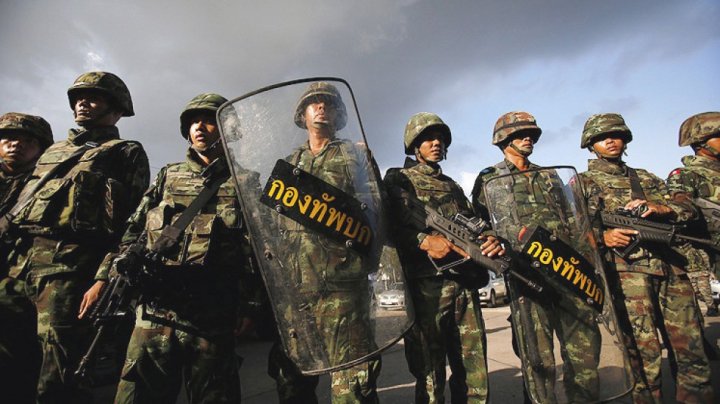A look at Thailand, four years after the army seized power
 publika
publika
When rifle-toting soldiers overthrew Thailand's elected government in a bloodless coup, the new military leaders pledged reform and reconciliation and promised they wouldn't stay long.
Four years later they're still there and frustration is growing.
But far from stepping back they appear to be planning to tighten their grip on power.
A Saturday night in Bangkok and a punk group is in full flow. Nothing unusual in that.
But then the singer insults the Prime Minister, in an angry tirade. Next stop: the police station, and a warning.
No matter if it's on the streets, online or, as here, on stage, dissent in Thailand comes at a price.
"This is the first time we've played a concert and it's about politics because that's what we are interested in," says band member Yuttajak Dumsuwan, pleading their case.
The junta seized power in May 2014, ending months of turmoil as the country's urban elite sought to paralyze the elected government.
It promised to "return happiness to the Thai people".
But many feel the keynote today is frustration. Many basic rights remain suppressed.
Corruption and unaccountability persist.
General – now Prime Minister – Prayuth Chan-ocha denies he ever wanted the post, though he seems to enjoy and court the limelight.
As questions grow over the country's direction, the quick-tempered soldier is swift to counter-attack.
"You cannot say that we haven't done anything, otherwise, why have we been here for the past four years?" he said at recent news briefing.
Many Thais are grateful that Prayuth guided the country through the national trauma of the death of the revered King Bhumibhol.
They believe the discipline of military rule ensured stability at a crucial time.
And few people want to see a re-run of the violent and wearying street politics of the last ten or so years.
But others believe that debt is now paid, and it's time for the junta to go.
Corruption scandals have deepened the resentment.
It's emboldened some protesters to openly challenge the regime and demand they finally give up power.
All talk now is of a much-delayed election next year.
Political parties have started to register.
But instead of bowing out, there are strong signs the junta aims to stay in power.
While no party is yet allowed to campaign, Prayuth appears to be doing just that, with heavily-publicised trips to the regions.
He's also said to be wooing the support of veteran, influential politicians – the very class of people he contemptuously turfed out of office.
On top of that, the new, military-authored constitution is clearly designed to weaken the electoral chances of major political opponents.
The junta's aim appears to be to retain power, but to launder that power through an election.
Some believe more turmoil lies ahead.
"In many ways, in Thailand, Thai politics will have to get worse, a lot worse, before Thailand can navigate and regain its footing into the 21st century," says Thitinan Pongsudhirak.
On Tuesday, protesters plan to march on Government House to mark the fourth anniversary of the coup, and to demand an election this year.
It'll be the most direct challenge yet to the thin-skinned military men in power.